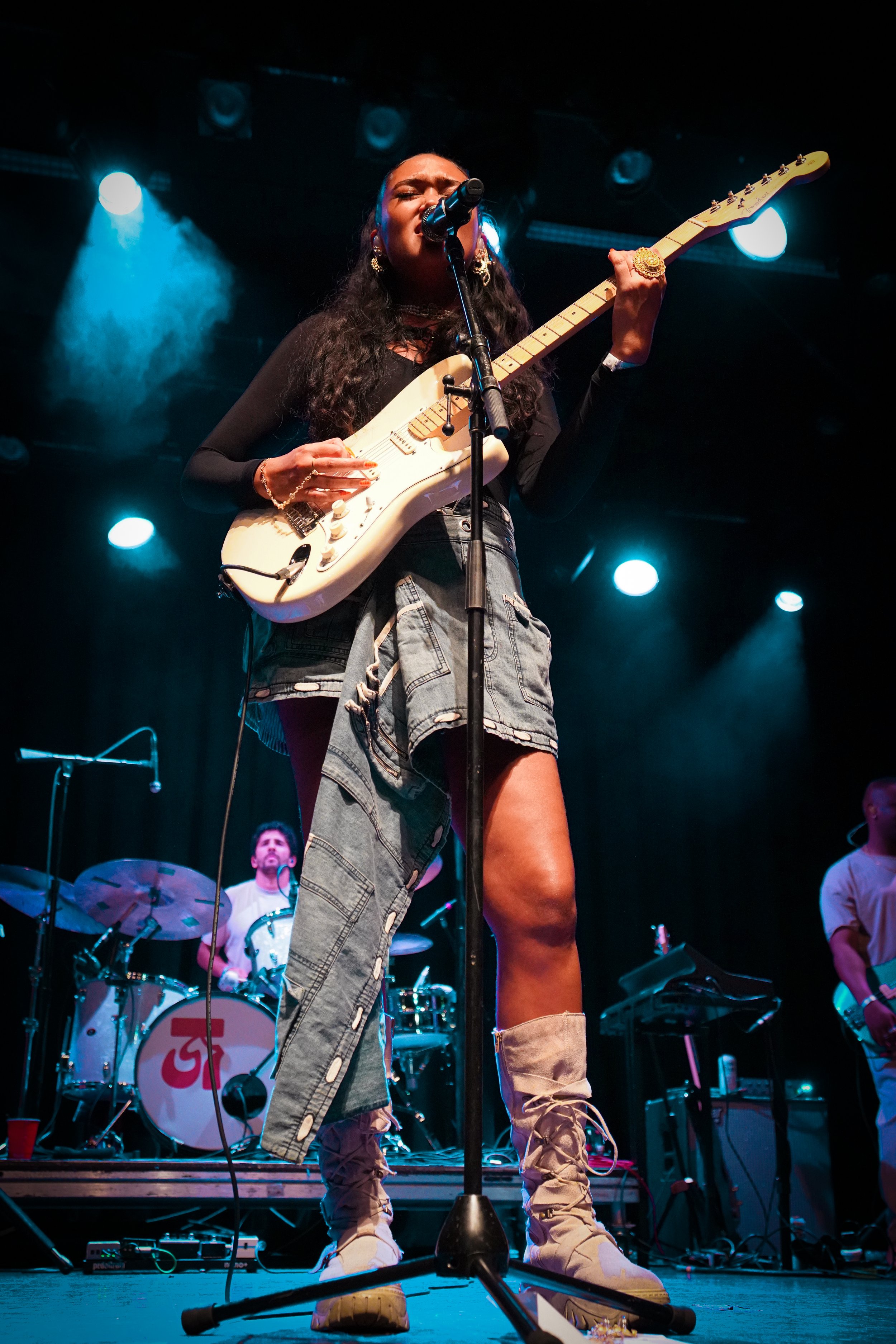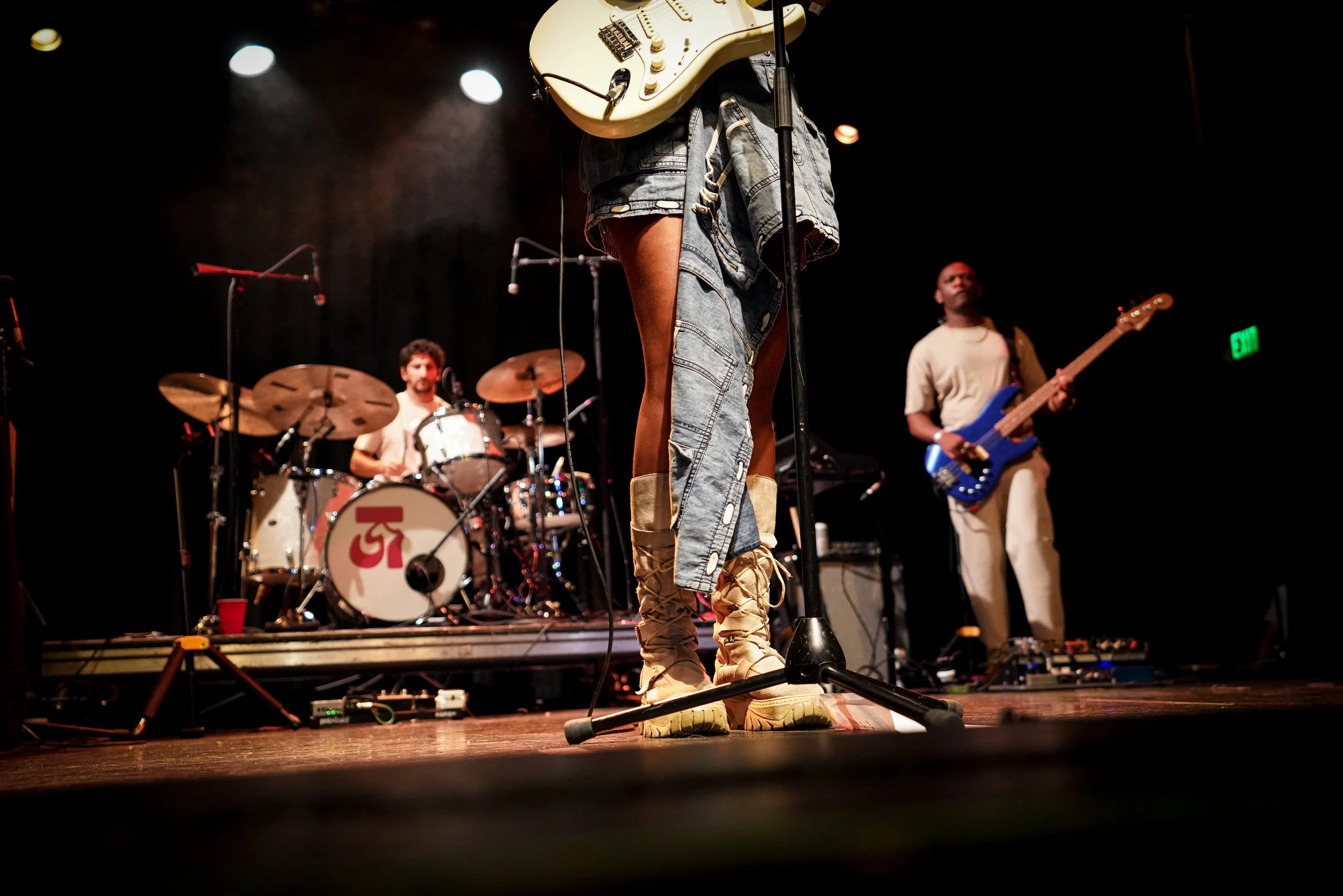Joy Crookes | El Rey Theatre Pre-Show Interview
by Shei Marcelline
Photographed by Shei Marcelline
Outside of Los Angeles’ iconic El Rey Theatre, Joy Crookes and I sat by the will call—her will call. Hovering above us was a classic box-fonted theater sign that read “Joy Crookes, Sold Out.” Surely a fulfilling attainment for the London-born songstress. Compiling this success, Crookes had only announced the September 27th show six days prior. As fans that were lined up for hours began to pass back and forth, making note of her presence, she settled in her seat, lit a Marlboro Gold, and we began chatting—her speaking voice perfectly attuned to her diaphanously sonorous singing one.
Crookes’ 2021 album, ‘Skin,’ does not shy away from vulnerability as she has perfectly curated a project that interweaves the reveries of emotion with potent instrumentals. The Bangladeshi-Irish artist has a niche for captivating audiences with her deep soulful voice, exhibited in the project’s popular tracks ‘Feet Don’t Fail Me Now’ and ‘When You Were Mine.’ There seems to be an ineffably personal facet to this project—which I learned from the writer herself is longing. Crookes shared with me, “Whether that's longing to have sex or longing to repair trauma. Everything I go back to is longing.”
Now comfortable in the complexity of her identity, Crookes has entered a mental space where contentment comes from within. I asked her about the pressure of facing cultural stigma and its effect on identity, to which she laughed and replied, “I got cultural stigma from being born, babe… I know stigma like the back of my hand. I think our culture can be deeply judgmental and I've experienced that my whole life… That's why there's a certain Asian person that comes to my show—the ones that feel like outsiders, not just because they're South Asian, but maybe because they're South Asian and gay, or maybe because they're South Asian and darkskin, or maybe because they're South Asian and mixed.”
Read the full Flaunt exclusive interview with Joy Crookes below as she discussed the beginnings of her career, her album ‘Skin,’ and the larger life dilemmas surrounding identity and cultural stigma.
Could you tell me about your musical beginnings?
Basically I lived with my guitar—like my guitar would be in my bed. So I woke up, played guitar, went to bed, played guitar in my dreams. I just always played guitar. I also had a big CD collection, so I listened to CDs every morning while I was getting ready. I always have to carry my Beats Pill now because I need to listen to music all the time.
Whose CDs were you listening to?
I used to wax my legs to Patti Smith and the Rolling Stones. I used to listen to indie bands from the U.K., like Hot Chip and Metronomy. I listened to compilation reggae CDs that are roots reggae by a record label called Trojan, which I know is a condom brand here, which is why I can never wear my Trojan t-shirt here. Everyone thinks I'm promoting condoms, which, you know, safe sex is great, but I really like the music as well. I'd also plug into YouTube and listen to old Nina Simone and Sarah Vaughan—stuff like that.
At what point did you begin singing and songwriting?
When I started to play chords, it was almost like someone told me that you learned better muscle memory if you sing along with what you're playing. So even when I played piano, I wasn't singing to sing, I was singing to remember where the notes were. It's like muscle memory. But then I would learn really simple Justin Bieber or Taylor Swift songs on the guitar and then I was just singing along. I think I found diaries really annoying, so I just wrote songs instead.
Your album, ‘Skin,’ has had a lot of great success. What was your songwriting process?
It was definitely a ton of songs that I already had. I didn't have a concept. I just kept writing songs that I thought were good and then compiled those songs and went into a studio to record the album.
What do you think is your most underrated song?
Maybe ‘Unlearn You’ or ‘Skin’. I think like the diehards know ‘Skin’, but I think ‘Skin’ is probably one of the best songs I've ever written.
If you could sum up the central theme in this album, what would it be?
I think longing—whether that's longing to have sex or longing to repair trauma. Everything I go back to is longing. I think that I'm a very longing person. I think that I long a lot. It's also a very Asian thing. In Bollywood films they’re always longing, like there's always something that people are yearning for or lamenting on. Yearning is probably my go to and then that coincides with nostalgia. Yeah, yearning, longing, lamenting.
At the end of ‘I Don’t Mind,’ we hear a recording of you saying, “I love you Nani,” to your mom. Did she know you were adding that in?
It's what I say to her every time I leave the house. So every time I leave her house I press the button that goes to the 19th floor and that is the actual button I press. So when I go to our house, I still have to hear that. And whenever I leave I go, “I love you Nani” and she always goes, “I love you,” and I can still hear her when I'm in the lift. It's not orchestrated. Actually, I didn’t tell her I was recording it.
Do you feel pressure or responsibility to be the South Asian representation that you didn’t see growing up?
I think it's a responsibility that's unfair. I think there should be room for everybody and me being South Asian representation is false because I can't represent it all. South Asia is an entire place, let alone all the countries that make up South Asia, all the religions, all the languages, all the sexualities. We're so complex as a culture and we also have so much ancient history, that I refuse to be the sole representation of that, because it's not fair on how diverse and intersectional and beautiful our culture is. There are light-skinned people, dark-skinned people, different ages, different backgrounds, different cultures within our culture.
I find it upsetting that generally by—I guess more so by a certain kind of journalism— I am coined the ‘South Asian representation,’ but there should be room for everyone. South Asia is a really big place. They don't understand that. Cause I'm called “representation” and that makes no sense. There should be many more of us.
Did you encounter any cultural stigmas for pursuing a career in the arts?
I got cultural stigma from being born, babe. I'm Bangladeshi-Irish. I'm not even Bangladeshi-English. My dad is a full-on Irishman. That's very different from being a wealthy Englishman that my dad is a working class Irishman. I know stigma like the back of my hand. I think our culture can be deeply judgmental and I've experienced that my whole life. I really get on with the lot of Asians who have felt stigma in a certain way. Our trans community, our hetero community, our gay community, darkskinned Asians. There are so many points of judgment within our cultures and I think all the stigmas that I've faced as a multifaceted human being that also happens to be South Asian, is something that I've been used to from far too young.
That's why there's a certain Asian person that comes to my show—the ones that feel like outsiders, not just because they're South Asian, but maybe because they're South Asian and gay, or maybe because they're South Asian and darkskin, or maybe because they're South Asian and mixed. There are so many factors that make us feel like we’re outsiders and that's not just being South Asian. What I promote is for people to be themselves.
Identity is more than just your race, your identity is who you are as a whole person.
Yes, identity is so complex. You are whatever you want to be. I am South Asian amongst other things.
What would you tell your younger self right now—sitting here today outside of the El Rey Theatre, about to headline a show?
I would say no more than practice love and just fuck them. “Just fuck ‘em.” My dad used to say that to me every morning. He’d come into my room and be like, “Joy, fuck ‘em.” And I'm like, “What does that mean?” And he was like, “You'll understand. You'll need it. Just fuck ‘em.”





